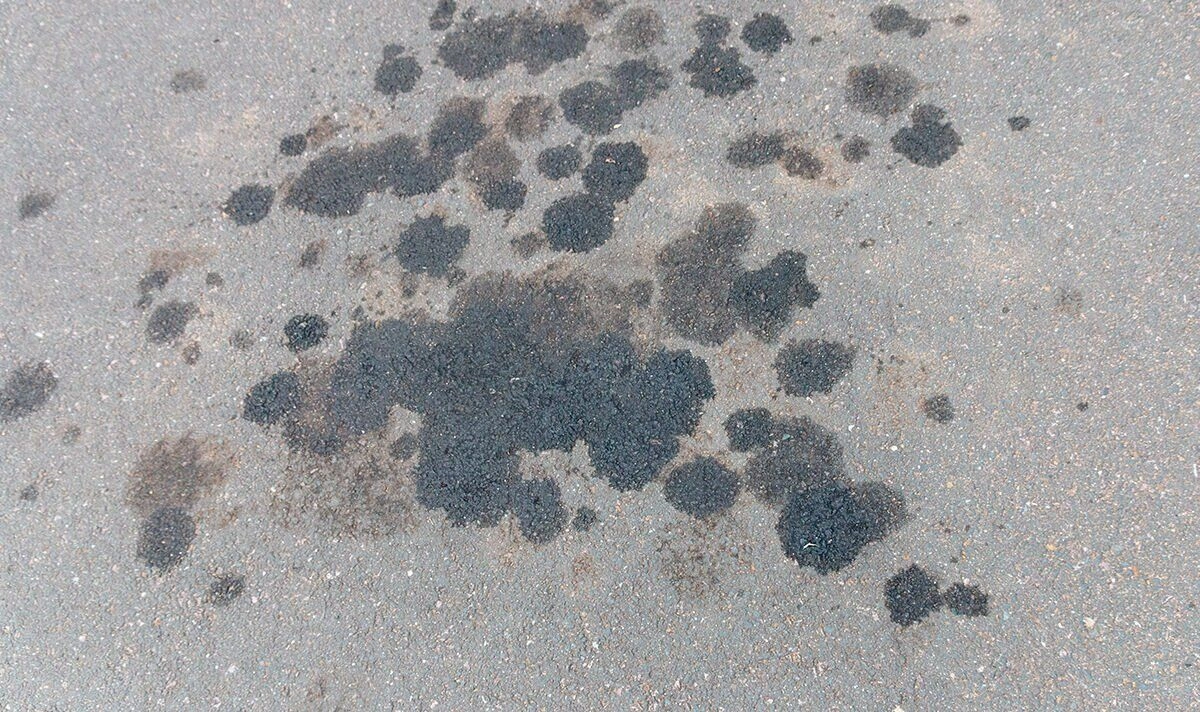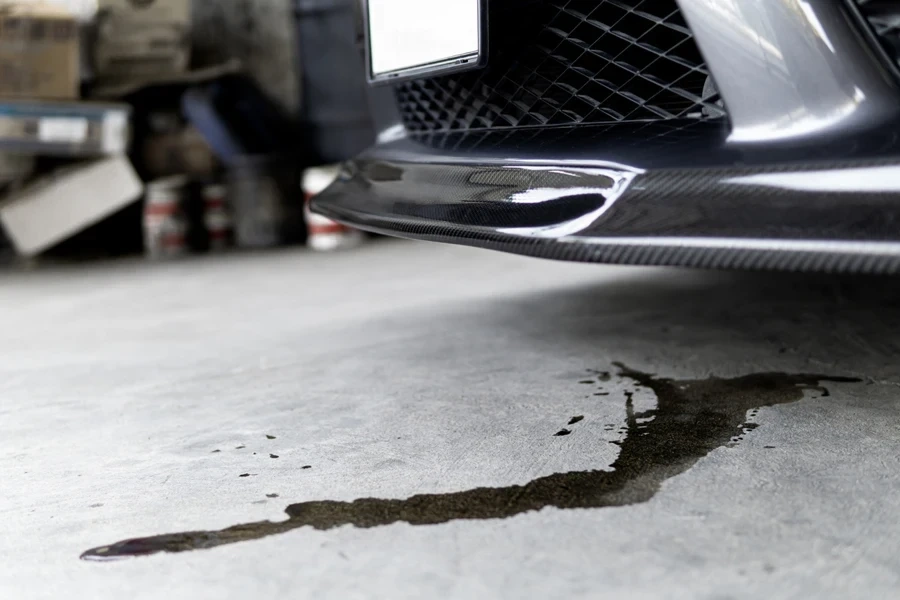It can be annoying and unsightly to remove oil stains from a driveway. These stains, which can be brought on by a leaky car, lawnmowers or a straightforward maintenance error not only degrade the appearance of your driveway but also erode its surface over time. Thankfully, you can learn exactly how to remove oil stains from your driveway and effectively restore its appearance, even for older, more stubborn stains, if you follow the right steps.
Why Oil Stains Are a Problem

Oil stains seep into porous driveway materials like concrete, block paving and even resin bound surfaces. Over time, these stains attract dirt, grow larger and can even create slipping hazards when wet. The deeper the oil seeps, the harder it becomes to clean, especially if no sealant was applied to the surface.
Leaving stains untreated not only affects aesthetics but can also shorten the lifespan of your driveway by weakening the surface, allowing weeds or moss to grow in the affected areas.
What Causes Oil Stains on Driveways?

Understanding the root of the problem helps in both removal and prevention. Common causes include:
Leaking Vehicles: Cars or vans that drip oil when parked in the same spot regularly.
DIY Maintenance: Accidental spills during oil changes or engine repairs.
Unsealed Surfaces: Driveways without a protective sealant absorb oil faster.
Lawn & Garden Equipment: Overfilled petrol trimmers, mowers, or generators.
Tool Storage: Leaving oily tools or machinery on the surface for extended periods.
Step-by-Step Guide: How to Remove Oil Stains from Your Driveway
Removing oil stains from a driveway can be both frustrating and unsightly. Whether caused by a leaky car, lawn equipment, or a simple maintenance mishap, these stains not only ruin the look of your driveway but can also weaken the surface over time. Fortunately, with the right steps, you can learn exactly how to remove oil stains from your driveway and restore its appearance effectively—even for older, set-in stains.
How to Remove Fresh Oil Stains from Your Driveway?
If the oil spill just occurred, time is critical. Immediately blot the oil using paper towels, rags, or newspaper. Be gentle don’t rub, as that will push the oil deeper into the surface.
Absorb the Oil Stain from Your Driveway Surface
Cover the stained area with an absorbent material like cat litter, baking soda, or sawdust. These draw the oil out of the driveway. Leave it in place for 2–4 hours, or overnight for stubborn stains.
Pre-Treat and Scrub the Oil Stain on Your Driveway
After removing the absorbent, apply a mix of dish soap or degreaser and warm water. Scrub with a stiff-bristled brush in circular motions to loosen the oil.
Rinse the Driveway to Remove Oil Residue
Use a garden hose to rinse the cleaned area. Skip the pressure washer at first—it may spread the oil if it’s not fully broken down yet.
Repeat the Cleaning Process for Stubborn Driveway Oil Stains
Some stains, especially old ones, may require multiple treatments. Be patient and repeat the above steps until the stain fades.
Bonus Tips: Best Practices for Removing Oil Stains from a Driveway
-
Use a commercial degreaser for deep stains
-
Test chemical cleaners in an inconspicuous spot
-
Clean spills quickly to avoid long-term damage
-
Schedule regular driveway cleaning to prevent buildup
Restore Your Driveway by Removing Oil Stains Effectively
Now you’ve learned how to remove oil stains from your driveway using affordable materials and simple steps. From fresh spills to set-in stains, these tips can help you restore a clean, safe, and attractive surface in no time.
Key Takeaway
Whether it’s a fresh spill or an old blotch, learning how to remove oil stains from your driveway is essential for maintaining a clean and safe outdoor space. With the right materials and a bit of elbow grease, your driveway can look like new again.
Common Driveway Materials & Cleaning Recommendations
| Driveway Material | Best Absorbent | Cleaning Agent | Power Washing Safe? | Special Notes |
|---|---|---|---|---|
| Concrete | Cat litter, baking soda | Dish soap, degreaser | Yes (after scrubbing) | Porous surface – quick action improves results |
| Asphalt | Sawdust, cornmeal | Mild degreaser | No | Softer surface – avoid harsh chemicals or pressure |
| Block Paving | Cat litter | Soapy water, vinegar mix | Yes (with care) | May require re-sanding after cleaning |
| Resin-bound | Baking soda | Specialist resin cleaner | Yes (low pressure) | Avoid solvents or acidic cleaners |
Natural Cleaning Alternatives (Eco-Friendly & Safe)
For homeowners who prefer natural options or want to avoid strong chemicals near gardens, here are three reliable solutions:
Baking Soda + Warm Water: Mix into a paste and apply directly. Let sit for 30 minutes, scrub, and rinse.
White Vinegar + Dish Soap: Mix equal parts and pour onto the stain. Allow it to soak before scrubbing.
Laundry Detergent Paste: Mix powder detergent with warm water and apply to old stains. Effective on concrete and pavers.
These options are safe for pets, children, and surrounding plants.
Preventing Future Oil Stains
Prevention is often easier (and cheaper) than repair. Here are a few practical tips to stop oil stains before they start:
Use Drip Pans or Oil Mats: Place them under vehicles that are parked for long periods.
Inspect Vehicles Regularly: Routine checks can catch leaks early.
Seal Your Driveway: Apply a driveway sealer every 2–3 years to protect porous surfaces.
Store Equipment Properly: Keep lawn mowers, trimmers, or generators in sheds or on absorbent pads.
Don’t Overfill Machinery: Fuel and oil spills often happen from careless refilling.
FAQs
Q: Can oil stains be completely removed?
A: Fresh oil stains are easier to remove. Older stains may not disappear entirely but can be faded significantly with repeated treatment.
Q: Should I use a power washer first?
A: No. Always pre-treat and scrub first. Power washing untreated oil may drive it deeper into the surface or spread it.
Q: Are commercial degreasers better than natural cleaners?
A: Commercial options may work faster but can be harsh. For general use, natural solutions are safer and effective with repeated use.
Q: Is there a best time to clean oil stains?
A: Yes, choose a dry, sunny day. Warm temperatures help break down oil and dry out the surface faster after cleaning.
Q: Can oil stains affect property value?
A: Absolutely. A stained driveway can make a poor first impression and signal neglect during home appraisals or sales.
Final Thoughts
Oil stains on your driveway don’t have to be permanent. With quick action, the right absorbents, and proper cleaning agents, even the toughest stains can be reduced or removed. Whether you’re dealing with a small drip or a large patch from vehicle maintenance, staying consistent with cleaning and applying preventative measures will keep your driveway clean, safe, and long-lasting.
Need Help Restoring Your Driveway?
At Advanced Driveway Solutions, we offer professional driveway cleaning, oil stain removal and long-lasting maintenance services tailored to your surface type. Whether it’s concrete, block paving, or resin-bound, our expert team ensures a spotless, well-protected finish.
